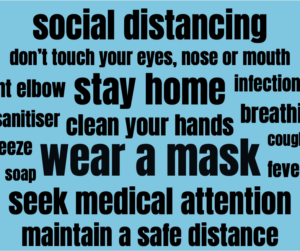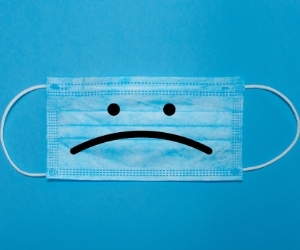
COVID-19 has a devastating effect not only on human lives and world economies, but also on our mental health. Some people find it difficult to adapt, especially now that it seems that the pandemic will never end. So today we decided to talk to Dr. Andrea Bernabé, the psychologist at Clínica La Siesta, to ask her some questions related to the pandemic, the COVID-19 depression, stress, and our emotional state in general.
– Good morning, Doctor. Please tell us a little bit about yourself and your experience in the field of psychology.
– Good morning. I began my undergraduate studies in psychology at the University of Murcia and later made a specialisation at UCAM, in Murcia as well. In addition, I have taken different complementary and specialised courses at the universities of Murcia, Elche and Oxford, England where I lived for three years since 2013 to 2016.
– To begin, we would like to make clear the distinction. What is the difference between the psychologist and a psychiatrist? When should you visit one and when the other?
– The main difference is that a Psychologist and a Psychiatrist have different training. A psychologist studies a degree in Psychology and then makes a specialty in mental health and can help you with problems of emotions, thoughts, behaviour, among others. On the other hand, a psychiatrist studies Medicine and specialises in mental illnesses and can prescribe medicines for serious mental disorders and illnesses such as very serious depressions, paranoia, delusions associated with psychotic illnesses.
– Did you have an increased number of patients with depression and/or anxiety after the COVID-19 pandemic has started and especially after the lockdown? What other problems related to these two factors have you encountered?
– Yes, cases of illness or symptoms of depression and anxiety have increased since the pandemic began. In addition, in the case of other diseases or mental disorders we have also been able to observe that the main symptoms have worsened or new symptoms have appeared due to lockdown, fear, loneliness and the reduction of social or family encounters for precautionary reasons.

– There are different extremes of people regarding COVID-19: people who obsess too much and people who care too little. Which one is more dangerous and what would you recommend to them?
– Both extremes are dangerous: those who worry excessively could even make their illness worse if they experience symptoms of anxiety, paranoia etc., and those who do not worry could infect other people whom the illness could affect fatally. As I have said before, before any doubt, symptom or diagnosis of COVID-19, patients should consult with their family doctor for more information and specialised treatment and if they experience symptoms related to anxiety, depression or others, they should consult a psychologist.

– How to overcome the fear of catching COVID-19 and get on with your life (and not catch COVID-19 depression instead)?
– In the first place, the most important thing is to comply with the rules and instructions that the health authorities inform every day and in an updated way, such as, for example, using a mask, hand hygiene, maintaining social distance, reducing social contacts, respecting schedules of shops etc. If we still get sick with COVID-19 or we think it could be so, we must call or go to the corresponding health centre to make a diagnosis and stay home and do a correct and responsible quarantine.
Depending on your state of health and how the disease has affected you, you should stay in bed for a while and eat as healthy as possible. On the other hand, if you have mild symptoms, you can take the opportunity to read, write, paint, watch movies or series or do any of your favourite activities or other activities that you wanted to do for a long time but did not have that time. It can be a time to do new things!
– Is stress very dangerous? How would you recommend handling it?
– Stress can be highly dangerous because it can trigger or activate new diseases in our body or make us somatise stress symptoms, for example, headaches, stomach pain, joint pain, muscle pain, bone pain, etc. It is advisable to follow a healthy lifestyle based on a healthy diet, physical exercise and find time for your hobbies. If you still cannot relax or have stress problems that you cannot handle yourself, I advise you to seek professional help. We will be delighted to assist you.
– How can one tell apart depression from a consistently bad mood/emotional state?
– Although a bad mood or irritable mood could be considered a symptom of depression, a depression is characterised by a set of symptoms such as lack of energy, difficulty sleeping or, on the contrary, sleeping excessively, feelings of sadness, worthlessness, guilt, self-hatred and lack or excess of appetite. So, we can say that bad mood by itself cannot be considered a depression, however, the bad mood, emotions and negative thoughts associated with it can be worked on.

